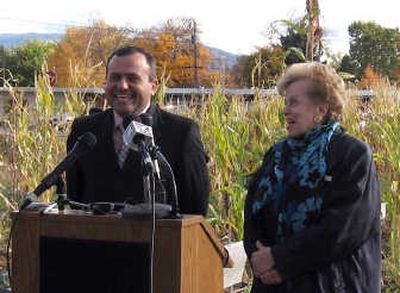Iraqi refugees creating new life in Northwest

BOISE – Zeyad Tarek Abdel Okhawa fell in love with all things American as a youngster and worked to perfect the English he’d studied in school since the fifth grade.
So when his country was invaded by U.S. troops seeking to topple Iraqi ruler Saddam Hussein, Zeyad was glad to help.
“I believed in the United States and I believed they will be coming and bringing the change, and that clearly will be for the good,” he said Wednesday. “Unfortunately, things didn’t go so well, but I still have that hope.”
The former rice factory owner worked for the U.S. State Department, did a stint as a translator for the Marines, and was a key local employee for the Americans – all of which meant that, eventually, he had to leave. Zeyad and his wife and two young children were resettled in Boise in June, the first family resettled in the United States as part of a new push to bring in Iraqi refugees whose aid to Americans made it too dangerous to stay in their homeland.
The U.S. will welcome 12,000 Iraqi refugees in the coming year, U.S. Assistant Secretary of State Ellen Sauerbrey said as she joined Zeyad at a news conference Wednesday in Boise. “Very sadly, in many cases, they and their families have been targeted because of their association with the U.S.,” she said.
Refugee agencies in Boise expect to receive between 100 and 150 of those, and some will head to Spokane.
Linda Unseth, director of World Relief in Spokane, said one young man who was a victim of violence in Iraq was resettled in Spokane in late August. A couple of Iraqi families are expected in Spokane in the coming months.
Zeyad and his family were followed by a half-dozen other Iraqi families in moving to Boise, but he and his family are now moving once again – this time to the Washington, D.C., area, where he’s landed a job as a contractor with the U.S. State Department. It’s a step toward his dream job as a foreign service officer.
Asked to compare his past four months in Boise to his life in Al-Hillah, 70 miles south of Baghdad, Zeyad said, “Heaven to hell.” Though things were rough when he left his home city, he added, “Al-Hillah is one of the best cities in Iraq right now; we have very good security.”
Among those welcoming the refugees to Boise at Wednesday’s news conference were Idaho National Guard representatives. “U.S. military forces absolutely rely on the many Iraqis who assist us,” Lt. Col. Tim Marsano said.
Lt. Col. Dean Hagerman, who spent all of 2005 deployed in Iraq, said, “Without them I could not have done my job. They put themselves at great risk to help me and others in the brigade.”
Boise has become something of a magnet for refugees, in part because it has three active refugee resettlement agencies, a relatively low cost of living, lots of job opportunities and a welcoming community. Since 1980, 12,000 refugees have been resettled in Idaho, mostly in Boise. They’ve come from around the world, with large groups arriving in recent years from Bosnia, Uzbekistan and Somalia. Just in the past year, Boise has received 800 refugees from 20 countries.
“Refugees have done well here,” said Jan Reeves, director of the Idaho Office for Refugees.
Sauerbrey, who is head of the State Department’s Bureau of Population, Refugees and Migration, said that in Iraq, “We know that the first and foremost goal of the United States has to be to create a safe and stable country, so that people who are able to go home again have a place that they can look forward to living safely with their families. We also know that there are some Iraqis who will never be able to go home again, and those are the people that we are very, very urgently trying to bring into the U.S. as quickly as possible.”
Thousands of Iraqi refugees are in Jordan and Syria, awaiting entry to the U.S.
Christina Bruce-Bennion of the Agency for New Americans, one of Boise’s refugee resettlement agencies, said Iraqi refugees are a unique group, in part because the conflict in their country is still ongoing, and in part because some are highly educated and many already are fluent in English.
The first-priority group for resettlement in the U.S., she said, is those at risk because of their cooperation with the Americans.
“If you’ve in any way had contact with the U.S., it’s sort of like a big bull’s eye on your back – a target,” Bruce-Bennion said. “It’s very similar to what happened after the Vietnam War.”